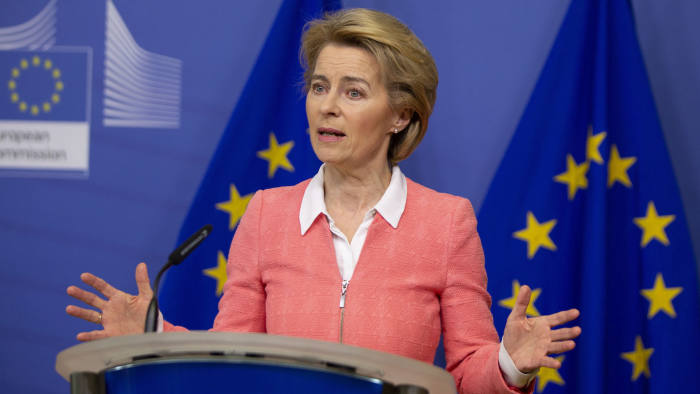
Brussels’ plan for a carbon border levy on imports risks getting snarled up in political resistance and compliance that could radically reduce the scope of the measure and delay it for years, officials have warned.
As part of the EU’s push to become climate neutral by 2050, the European Commission has promised a “carbon border mechanism” that would impose sanctions on foreign C02 imports to protect European industries from being undercut by overseas polluters. The idea is among the most radical elements of commission president Ursula von der Leyen’s “Green Deal” and has already raised concern from the US and China about European “protectionism”.
Officials have vowed to put forward a proposal by next year. Frans Timmermans, commissioner in charge of the Green Deal, last week said the scheme was designed to prevent “carbon leakage” — where activities and industry could decamp from the EU to countries with less onerous environmental standards. “We will protect European industry if it takes a historic step to decarbonise,” he said.
But behind the promises, diplomats and officials have warned the mechanism is a uniquely complicated and unprecedented exercise that has already provoked resistance from powerful member states including Germany. Berlin has voiced fears that a carbon tax would intensify tit-for-tat trade retaliation from the US targeting its car industry.
“We should take into account that some jurisdictions, particularly the US, are just waiting for a reason to slap tariffs on EU products,” said Markus Ferber, a German MEP. The border tax was “the perfect pretext” to do that, “particularly as the current US administration is not too keen on fighting climate change”, he added.
Among the questions is how the EU can ensure the mechanism, which the commission is no longer calling a “tax”, does not fall foul of World Trade Organization rules.
Phil Hogan, EU trade commissioner, told the Financial Times last month that if the measure was “not WTO-compatible then we have to look at an alternative way”.
Diplomats also warn that political resistance will mean that even after a proposal is put forward in 2021, member states and MEPs could take years to agree on the final mechanism’s workings. “This won’t see the light of day until we are in the final years of this commission,” said one diplomat. Another official said the EU was banking on never having to use the tool if the US — should Mr Trump lose this year’s presidential election — falls back in line with international climate targets.
Commission officials admit the scope of the legislation is likely to be initially limited to target areas such as cement rather than more politically sensitive imports, including steel. Other open questions include how the scheme would be governed and whether sanctions would automatically apply to countries that did not abide by the goals of the Paris climate accord.
Guest post from Financial Times





